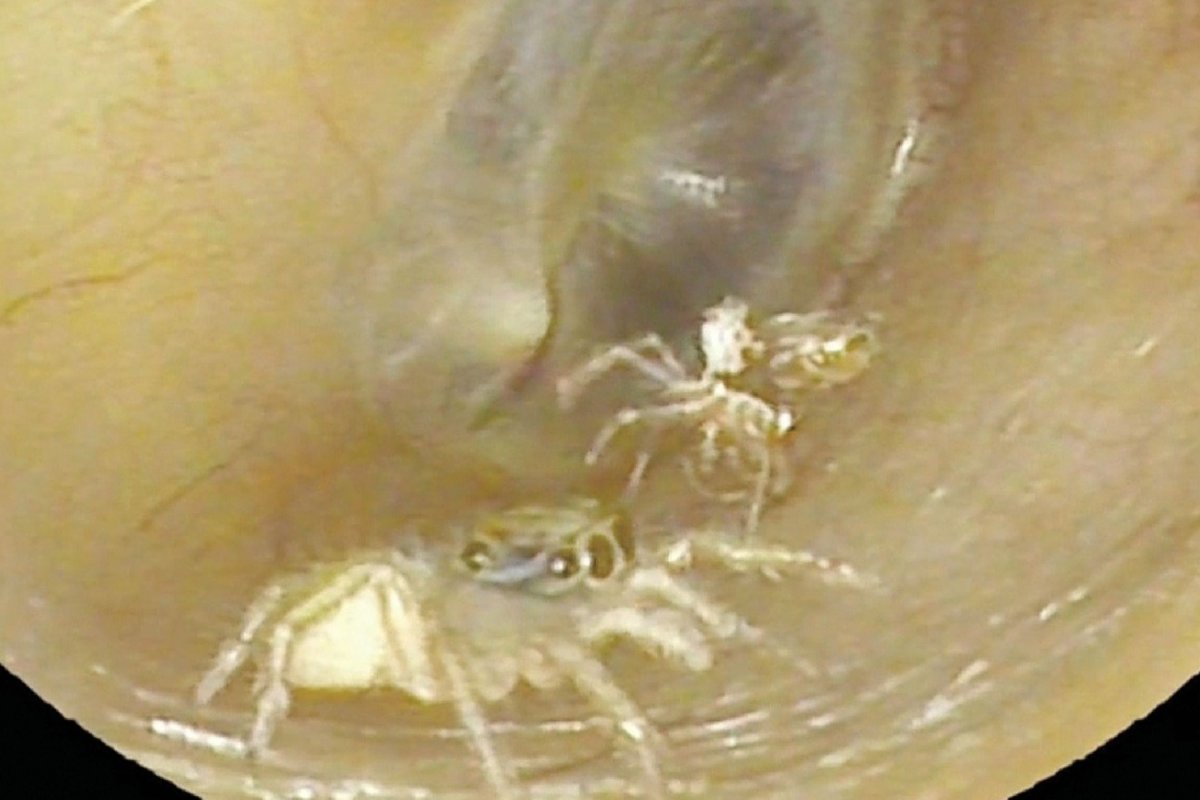In a scene straight out of a horror movie, a woman had a spider nesting and shedding its exoskeleton inside her ear.
The 64-year-old woman discovered the spidery squatter after going to the Tainan Municipal Hospital in Taiwan and saying she had heard strange sounds coming from inside her left ear over the past few days.
When doctors investigated, they found the unwelcome arachnid camped out alongside one of its molted exoskeletons, according to a case report in The New England Journal of Medicine.
Spiders molt in order to grow. Their exoskeletons are made of rigid chitin, which cannot grow as the spider's body inside gets larger. Therefore, the spider will shed the exoskeleton, leaving it vulnerable for a little while as its freshly revealed exoskeleton hardens. Dark, secluded locations—like inside an ear—are ideal for molting because they are safe from predators.
"On the day of symptom onset, she had awoken to the feeling of a creature moving inside her left ear," the doctors wrote in the case report. "Subsequent incessant beating, clicking, and rustling sounds had led to insomnia. On physical examination, a small spider was seen moving within the external auditory canal of the left ear."

The species of spider was not specified but was small enough to fit inside the woman's ear canal, which measures around 0.2 inches in diameter. The spider was seen next to one of its old exoskeletons that it had molted inside the woman's ear.
"It is not uncommon to find a spider in humans. It usually finds a dark place to molt. That is why I guess it stays there," Tengchin Wang, one of the hospital's doctors involved in the case, told Newsweek.
Despite the urban legend claiming that we all swallow eight spiders every year, spiders rarely crawl into our mouths during the night.
"Vibrations are a big slice of spiders' sensory universe," Rod Crawford, an arachnid curator at Seattle's Burke Museum of Natural History and Culture, told Scientific American. "A sleeping person is not something a spider would willingly approach."
Fortunately, this little spider caused no harm to the woman, except giving her a nasty fright. Sometimes, spiders and other insects that crawl into an ear can damage the ear canal or even the eardrum.
"According to previous reports, some venomous species [can enter] into humans' ears that can hurt people either by venom or scratching canal skin," Tengchin said.
The doctors removed the spider using suction, leaving the woman's ear spider-free and no longer plagued by the strange sounds the spider had been making.
"In cases of larger spiders or insects in the external auditory canal, instillation of lidocaine or ethanol is recommended for killing the animal before removal in order to prevent excessive movements and subsequent damage to the structures of the ear," the doctors wrote in the case report. "However, liquids should not be introduced into the ear if the tympanic membrane has been perforated."
Do you have an animal or nature story to share with Newsweek? Do you have a question about spiders? Let us know via nature@newsweek.com.
Uncommon Knowledge
Newsweek is committed to challenging conventional wisdom and finding connections in the search for common ground.
Newsweek is committed to challenging conventional wisdom and finding connections in the search for common ground.
About the writer
Jess Thomson is a Newsweek Science Reporter based in London UK. Her focus is reporting on science, technology and healthcare. ... Read more
To read how Newsweek uses AI as a newsroom tool, Click here.








